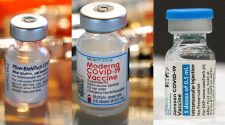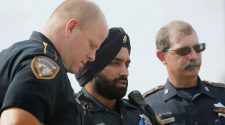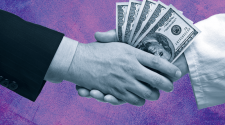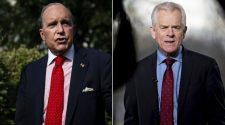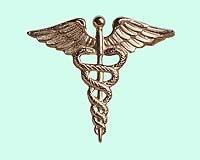Here’s what you need to know:

It was only two years ago, in the heat of the United States presidential election campaign, that President Biden called Prime Minister Boris Johnson of Britain a “physical and emotional clone” of President Donald J. Trump.
He did not mean it as a compliment.
But now, as the two stewards of the “special relationship” between Britain and the United States prepare to meet face to face for the first time since Mr. Biden took office, they will stress the enduring strength of the alliance.
They are expected to emphasize a joint vision for a sustained global recovery from the pandemic and will evoke the two nations’ powerful shared history to drive home the point.
Mr. Biden and Mr. Johnson are expected to announce what is being billed as a renewal of the Atlantic Charter — the declaration of post-war cooperation that Prime Minister Winston Churchill and President Franklin D. Roosevelt laid out in 1941 during World War II.
Still, the fundamental issues that divide them remain.
Mr. Biden opposed Britain’s drive to leave the European Union, a push that Mr. Johnson helped lead. The American president is also concerned about Northern Ireland, since the Brexit deal has inflamed tensions and threatened to reignite sectarian tensions.
“President Biden has been crystal clear about his rock-solid belief in the Good Friday Agreement as the foundation for peaceful coexistence in Northern Ireland,” the White House national security adviser, Jake Sullivan, told reporters aboard Air Force One on Wednesday, referring to the 1998 accord that helped bring about peace in the territory, which is part of the United Kingdom.
Mr. Biden and Mr. Johnson will meet on Thursday afternoon at Carbis Bay in Cornwall, before Friday’s meeting of Group of 7 leading industrial nations.
It is the start of a whirlwind weeklong tour that includes meetings with Queen Elizabeth II on Sunday, NATO officials and European Union leaders next week, plus a summit with President Vladimir V. Putin of Russia.
Mr. Biden began his first overseas trip as president on Wednesday evening by telling United States troops in Britain that the world’s future depended on restoring the longstanding alliances with Europe that have been “hardened in the fire of war” and built by “generations of Americans.”
Speaking to troops at R.A.F. Mildenhall, he called his weeklong diplomatic overture “essential,” saying that no nation acting alone could meet the world’s challenges. But he also vowed to stand up to adversaries like China and Russia, pledging to tell Mr. Putin “what I want him to know.”
On the eve of meeting with European leaders rattled by Russia’s aggressive movement of troops along Ukraine’s borders, Mr. Biden pledged to “respond in a robust and meaningful way” to what he called “harmful activities” conducted by Mr. Putin.
Mr. Biden also cast his trip in broader terms as an effort to rally the United States and its allies in an existential struggle between democracy and autocracy.
“I believe we’re in an inflection point in world history,” Mr. Biden said, “a moment where it falls to us to prove that democracies not just endure, but they will excel as we rise to seize enormous opportunities in the new age.”

One of the toughest issues President Biden is expected to take up this week with Prime Minister Boris Johnson of Britain is the status of Northern Ireland, where Brexit-fueled tensions threaten the return of lethal sectarian violence.
But now, a part of London’s Brexit deal with Brussels is inflaming resentment among unionists. To avoid resurrecting a hard border with Ireland — an unpopular idea on both sides of the boundary — the Northern Ireland Protocol requires checks on goods flowing between the North and the rest of the United Kingdom.
Creating a commercial border between Northern Ireland and the rest of the country violates promises made by the British government and imposes an economic and psychological cost. Northern Irish people who want to remain in Britain feel betrayed, and there have been violent protests against the protocol.
“It has hit the community here like a ton of bricks that this is a separation of Northern Ireland from the rest of the United Kingdom,” said David Campbell, chairman of the Loyalist Communities Council, which represents paramilitary groups that some say are stirring up unrest.
Mr. Biden has warned Mr. Johnson, who campaigned for Brexit and negotiated the deal with Brussels, not to do anything to undermine the Good Friday Agreement. He is also mulling the appointment of a presidential envoy for Northern Ireland.
“That agreement must be protected, and any steps that imperil or undermine it will not be welcomed by the United States,” Jake Sullivan, the president’s national security adviser, told reporters on Air Force One on Wednesday.
Asked whether Mr. Johnson had taken steps to imperil the agreement, Mr. Sullivan said: “President Biden is going to make statements in principle on this front. He’s not issuing threats or ultimatums.”
President Donald J. Trump embraced Mr. Johnson and Brexit, but Mr. Biden has been cooler to both. The new president is also a Roman Catholic and devoted Irish-American, fueling speculation that he will be more favorable to the Irish nationalist cause.

As it has with nearly every other major event of the past year, the pandemic looms large over this week’s Group of 7 summit, with world leaders already making commitments to do more to stop the coronavirus as they prepare for the three-day gathering that begins on Friday.
In recent months, wealthy nations with robust vaccination campaigns have quickly moved toward inoculating large swaths of their population. Now, they are pledging to help the rest of the world meet that goal, too.
In a statement released on Thursday, Prime Minister Boris Johnson, who is playing host to the summit as Britain takes up the G7 presidency this year, said it was crucial to use the moment to act.
“The world needs this meeting,” he said. “We must be honest: International order and solidarity were badly shaken by Covid. Nations were reduced to beggar-my-neighbor tactics in the desperate search for P.P.E., for drugs — and, finally, for vaccines,” he added, referring to personal protective equipment.
He said now was the time to “put those days behind us.”
“This is the moment for the world’s greatest and most technologically advanced democracies to shoulder their responsibilities and to vaccinate the world, because no one can be properly protected until everyone has been protected,” he added.”
President Biden, under pressure to address the global coronavirus vaccine shortage, will announce on Thursday that his administration will buy 500 million doses of the Pfizer-BioNTech vaccine and donate them among about 100 countries over the next year, the White House said.
“We have to end Covid-19, not just at home, which we’re doing, but everywhere,” Mr. Biden told United States troops at R.A.F. Mildenhall in Suffolk, England, on Wednesday evening. “There’s no wall high enough to keep us safe from this pandemic or the next biological threat we face, and there will be others. It requires coordinated multilateral action.”
Pfizer said in a statement announcing the deal on Thursday that the United States would pay for the doses at a “not for profit” price. The first 200 million doses will be distributed by the end of this year, followed by 300 million by next June, the company said. The doses will be distributed through Covax, the international vaccine-sharing initiative.
“Fair and equitable distribution has been our North Star since Day One, and we are proud to do our part to help vaccinate the world, a massive but an achievable undertaking,” Albert Bourla, Pfizer’s chief executive, said in a statement.

PLYMOUTH — Traveling overseas with a president is always a unique experience (including, on Wednesday, when a plane full of reporters was grounded by cicadas). But this year Covid has added new logistical wrinkles.
It was always clear that White House correspondents like me would have to be fully vaccinated before joining President Biden’s trip to Britain, Belgium and Switzerland. Who would want to crowd into packed press buses without that protection?
But the Covid rules in Britain — which is wrestling with whether to fully reopen its economy as it deals with a surge of infections driven by the Delta variant — meant that it wasn’t simple. Visitors from the United States to Britain, regardless of their vaccination status, are required to quarantine for up to 10 days upon arrival, with an opportunity to “test out” after five days with proof of a negative result.
That clearly wouldn’t work for covering the three-day Group of 7 meeting of world leaders in a coastal English enclave. So after a series of negotiations between the British government and the White House, a compromise was reached: We would get a waiver to enter the country, but with a strict testing regimen.
I took a P.C.R. test (a technique that looks for bits of the coronavirus’s genetic material and is considered more accurate than rapid antigen tests) two days before boarding the flight.
After landing at the Cornwall airport, we were tested again, this time with a kit that requires a gag-inducing swab in the throat that then gets used to swab the nose as well. I tested negative on both.
During our stay at a hotel in Plymouth, reporters are required to test again each day, by 7 a.m., using a take-home kit provided by the British health service. That involves a quick swab down the throat (more gagging), followed by one in both sides of the nose and then a few drops on what looks similar to a home pregnancy test: One line for negative, two for positive.
On Thursday morning, I took a picture of the result (negative) and sent it off. Reporters will repeat that each day as long as we are in Britain.
Our waiver does not allow us to wander around Plymouth, eat in restaurants or drink in bars. That has limited the collection of White House reporters to the hotel’s catering and delivery from food delivery services like Uber Eats. We wear masks indoors. It feels much like being in the United States before restrictions started lifting a few weeks back.
For me, the restrictions are welcomed. My bout with Covid last October developed after I traveled on Air Force One with President Donald J. Trump as he headed to a campaign rally in Pennsylvania. I developed symptoms on the same day that Mr. Trump did, and spent the next two weeks with a high fever and other typical symptoms. (My sense of smell is just returning now).
Having been infected last fall, and with the double-dose of the Pfizer vaccine, I feel very safe. But to be honest, the last thing I want is to return home on Air Force One next week with a new variant of Covid courtesy of my job. If that security means taking a daily test and ordering what the British call “takeaway” food every day, I’m OK with that.

The most pressing, vexing item on President Biden’s agenda while in Europe may be managing the United States’ relationship with a disruptive Russia. He will seek support from allies to that end, but no part of the trip promises to be more fraught than the daylong meeting with President Vladimir V. Putin on June 16.
On the eve of meeting with European leaders rattled by Russia’s aggressive movement of troops along Ukraine’s borders, Mr. Biden said the world was at “an inflection point,” with democratic nations needing to stand together to combat a rising tide of autocracies.
“We have to discredit those who believe that the age of democracy is over, as some of our fellow nations believe,” he said.
Turning to Russia specifically, he pledged to “respond in a robust and meaningful way” to what he called “harmful activities” conducted by Mr. Putin.
Russian intelligence agencies have interfered in Western elections and are widely believed to have used chemical weapons against perceived enemies on Western soil and in Russia. Russian hackers have been blamed for cyberattacks that have damaged Western economies and government agencies. Russian forces are supporting international pariahs in bloody conflicts — separatists in Ukraine and Bashar al-Assad’s government in Syria.
Mr. Biden called for the meeting with Mr. Putin despite warnings from rights activists that doing so would strengthen and embolden the Russian leader, who recently said that a “new Cold War” was underway.
Mr. Putin has a powerful military and boasts of exotic new weapons systems, but experts on the dynamics between Washington and Moscow say that disruption is his true power.
“Putin doesn’t necessarily want a more stable or predictable relationship,” said Alexander Vershbow, who was United States ambassador to Russia under President George W. Bush. “The best case one can hope for is that the two leaders will argue about a lot of things but continue the dialogue.”
White House officials say that Mr. Biden has no intention of trying to reset the relationship with Russia. Having concurred with the description of Mr. Putin as a “killer” in March, Mr. Biden is cleareyed, they say, about his adversary: He regards him more as a hardened mafia boss than a national leader.
At nearly the same time Mr. Biden was delivering his remarks on Wednesday, a Russian court outlawed the organization of the jailed opposition leader Alexei A. Navalny, potentially exposing him and his supporters to criminal charges.
But Mr. Biden is more focused on Russian actions abroad than its domestic repression. He is determined to put what his national security adviser, Jake Sullivan, calls “guardrails” on the relationship. That includes seeking out some measure of cooperation, starting with the future of the countries’ nuclear arsenals.
Mr. Biden’s associates say he will also convey that he has seen Mr. Putin’s bravado before and that it doesn’t faze him.
“Joe Biden is not Donald Trump,” said Thomas E. Donilon, who served as national security adviser to President Barack Obama and whose wife and brother are key aides to Mr. Biden. “You’re not going to have this inexplicable reluctance of a U.S. president to criticize a Russian president who is leading a country that is actively hostile to the United States in so many areas. You won’t have that.”

Cornwall, a county that stretches out over England’s far southwestern corner, is better known for hosting British vacationers on its beautiful beaches and windswept craggy coastline than for being at the center of major global decision-making. But this week it is playing host to some of the world’s most powerful leaders as the site of the Group of 7 summit.
Home to about 3,000 people, the village of Carbis Bay is at the center of the action as the leaders of some of the world’s richest democracies, along with the world’s news media, descend on the normally placid seaside area.
So why was the location chosen?
Cornwall was put forward as a site for the summit to showcase initiatives that the government hopes will bolster Britain’s image as a leading nation in efforts to address climate change.
The county has set a more ambitious timeline than the rest of Britain for slashing carbon dioxide emissions to net zero — a main focus of recent international initiatives. It has pledged to meet the goal by 2030, two decades ahead of the national goal.
There are also a number of industries across the region that cater to the renewable energy sector.
Cornwall was once a global center of tin and copper mining, but the last Cornish tin mine closed in 1998. Now, that mining heritage is being turned toward tech metal mining, with companies working to extract lithium for potential use in electric cars and batteries.
“As the eyes of the world look to Cornwall this week, not only will they see an area of outstanding beauty, they will witness a region that is innovative, exciting and looking firmly toward a bright future,” Prime Minister Boris Johnson said in a statement announcing new investment in the region.
While Carbis Bay will be the central location for the meetings, neighboring St. Ives — a tourist town known for its art scene — and other towns in the area will also play host to some events.
“There is a great opportunity for Cornwall and the U.K. to capitalize and drive investment in these industries,” Glenn Caplin-Grey, the chief executive of Cornwall and Isles of Scilly Local Economic Partnership, said in a statement.



